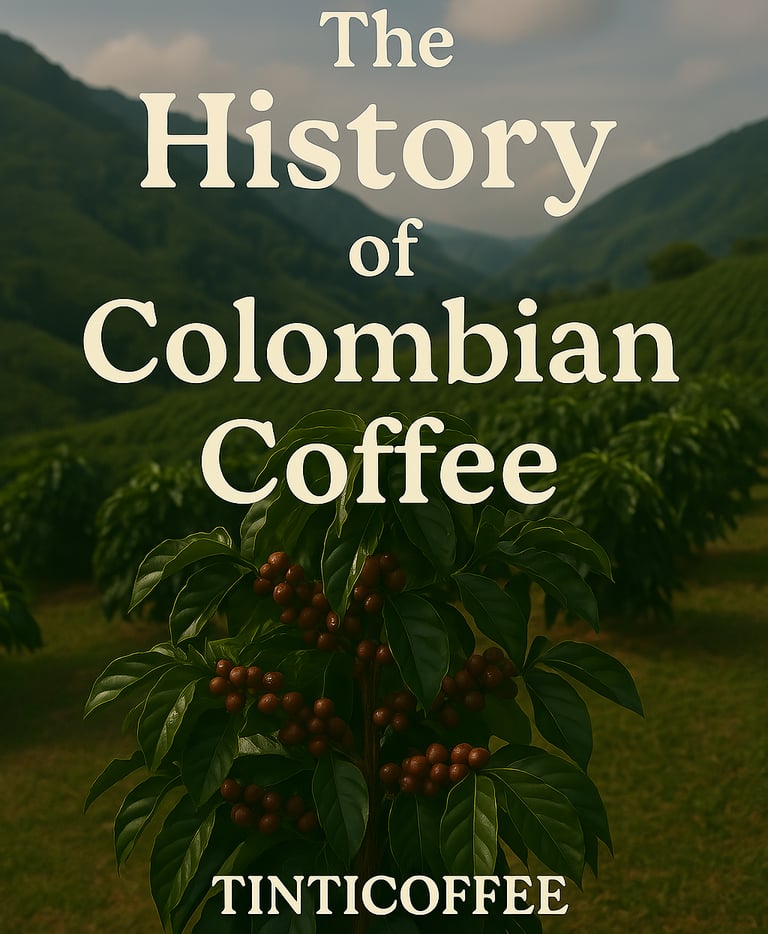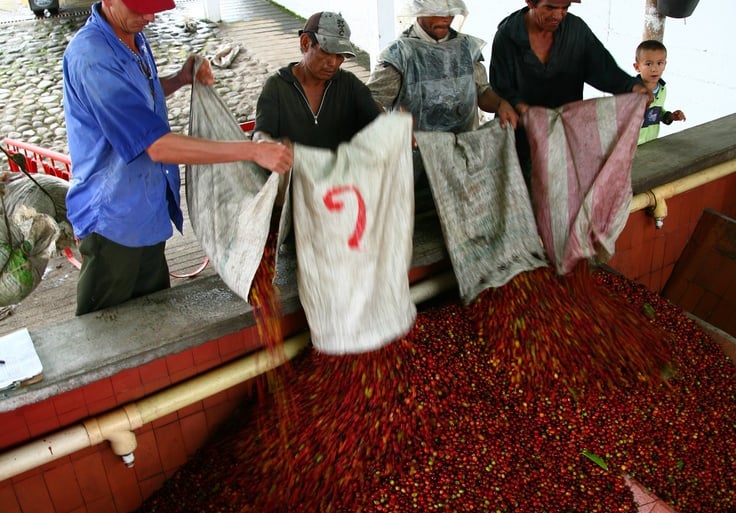Discover our mountain coffee, enjoy discounts!
The Rich History of Coffee in Colombia: From Jesuit Seeds to Global Exports
7/11/20255 min temps de lecture
The Arrival of Coffee: Jesuit Influence in the 18th Century
The introduction of coffee to Colombia can be traced back to the 18th century with the arrival of Jesuit priests, who played a pivotal role in its initial cultivation. These clergy were motivated by both spiritual and economic factors, seeing the potential for coffee as a means of supporting their missions and communities. The Jesuits introduced coffee seeds to Colombia, planting them primarily in the region of Antioquia, where the environmental conditions were highly conducive for coffee growth.
The unique climate of Colombia, characterized by its mountainous terrain and rich volcanic soil, provided an ideal backdrop for the cultivation of coffee. This specific geography allowed for the development of rich flavor profiles that have become synonymous with Colombian coffee. The Jesuits recognized these advantageous conditions and began to experiment with different growing techniques, nurturing the crop from its infancy. Their efforts laid the groundwork for what would eventually become one of Colombia's most important agricultural industries.
The Rise of Coffee Exports: 19th Century Milestones
The 19th century marked a transformative period for coffee in Colombia, as this commodity began to emerge as a leading export product. The establishment of export routes played a crucial role in facilitating the international trade of Colombian coffee. Initially confined to local consumption, Colombian coffee gained prominence on the global stage, particularly with improved transportation infrastructure that allowed for increased accessibility to international markets.
One of the pivotal milestones during this time was the growing international demand for coffee, spurred by the expansion of coffee culture in Europe and North America. Colombian coffee, known for its unique flavor profile and high quality, began to attract the attention of merchants and consumers alike. As the quality of beans was enhanced through selective cultivation practices, Colombian coffee exports flourished, contributing significantly to the country's economy.
The Colombian government played an integral role in promoting coffee cultivation through a series of policies and initiatives. Land grants and incentives encouraged farmers to expand their plantations, and the establishment of the National Coffee Federation in 1927 provided a structured approach to marketing and exporting this valuable crop. By creating standards for quality and branding, Colombian coffee began to distinguish itself from competitors on the global market.
This shift towards export-oriented coffee production had profound effects on the livelihoods of Colombian farmers. Many transitioned from subsistence farming to coffee production as a primary source of income, paving the way for economic development in rural areas. The rise of coffee exports not only transformed the agricultural landscape of Colombia but also contributed to the social and economic fabric of the nation, establishing coffee as a cornerstone of Colombian identity and culture. The 19th century laid the groundwork for Colombia's reputation as a prominent coffee producer, shaping its future in the global market.
Branding and Global Recognition: The Juan Valdez Phenomenon
The emergence of the Juan Valdez brand in the early 20th century marked a significant turning point in the branding and global recognition of Colombian coffee. Established by the National Federation of Coffee Growers of Colombia (FNC) in 1959, Juan Valdez was conceived as a symbol representing the hard work and dedication of Colombian coffee farmers. This iconic character, depicted as a traditional coffee farmer with his mule, served not only as a marketing figurehead but also as a vessel for the rich narrative surrounding Colombian coffee cultivation. Through his portrayals, Juan Valdez has come to embody the spirit of Colombian coffee, creating an emotional connection with consumers worldwide.
The branding strategy surrounding Juan Valdez was meticulously designed to spotlight the unique qualities of Colombian coffee, distinguished by its superior flavor profile and the meticulous care taken in its cultivation. This initiative positioned Colombian coffee as a premium product on the global stage, transforming perceptions and elevating its status in the competitive coffee market. The FNC’s emphasis on Fair Trade and sustainable practices further reinforced the brand’s association with quality and ethical sourcing, allowing consumers to appreciate not just the product but also the socio-economic implications behind their choice.
The impact of the Juan Valdez brand has also been visible in its ability to transcend borders, influencing how coffee is marketed and consumed across the globe. With targeted campaigns and strategic partnerships, the brand has successfully introduced Colombian coffee to diverse markets, fostering a sense of national pride among Colombian farmers. This illustrates how effective marketing strategies can contribute to preserving cultural identity while simultaneously boosting economic growth. The Juan Valdez phenomenon ultimately reflects a powerful confluence of branding efforts and cultural heritage, reshaping the global perception of Colombian coffee and establishing it as an integral part of the nation’s identity.
Colombia Today: A Leader in Sustainable Coffee Production
Colombia stands at the forefront of global coffee production, particularly heralded for its high-quality Arabica beans. The country's unique topography, climate, and rich biodiversity provide an ideal environment for cultivating coffee, leading to distinct regional flavor profiles. From the vibrant fruity notes of coffee grown in the Antioquia region to the floral undertones prevalent in the coffee from Huila, Colombia's diverse landscapes yield an array of flavors that are celebrated worldwide. Such diversity not only contributes to the international coffee market but also enriches Colombia’s cultural identity.
Coffee farming in Colombia plays a significant socio-economic role, providing livelihoods for over half a million families across the country. This agricultural backbone influences rural development, allowing communities to thrive as coffee connoisseurs globally continue to seek out Colombian coffee. The interconnectedness of coffee production with local cultures fosters a strong communal ethos, where traditions related to coffee harvesting and processing are passed down through generations. This emphasis on heritage, paired with economic necessity, reinforces the importance of sustainability in farming practices.
Contemporary Colombian coffee farmers are increasingly adopting sustainable farming methods to address both environmental degradation and the effects of climate change. Initiatives encouraging the use of agroforestry, organic fertilizers, and water conservation techniques are becoming widespread. These practices not only improve the quality of the coffee beans but also enhance eco-system resilience. However, the sector faces formidable challenges, including fluctuating coffee prices, adverse weather conditions due to climate change, and competition from other coffee-producing nations. In response to these obstacles, various organizations and government initiatives have emerged, promoting fair trade practices and providing technical support for farmers. By fostering environmentally friendly and socially responsible growth in coffee production, Colombia is not merely sustaining its rich coffee heritage; it is also shaping a future robust in ethical practices and environmental stewardship.





